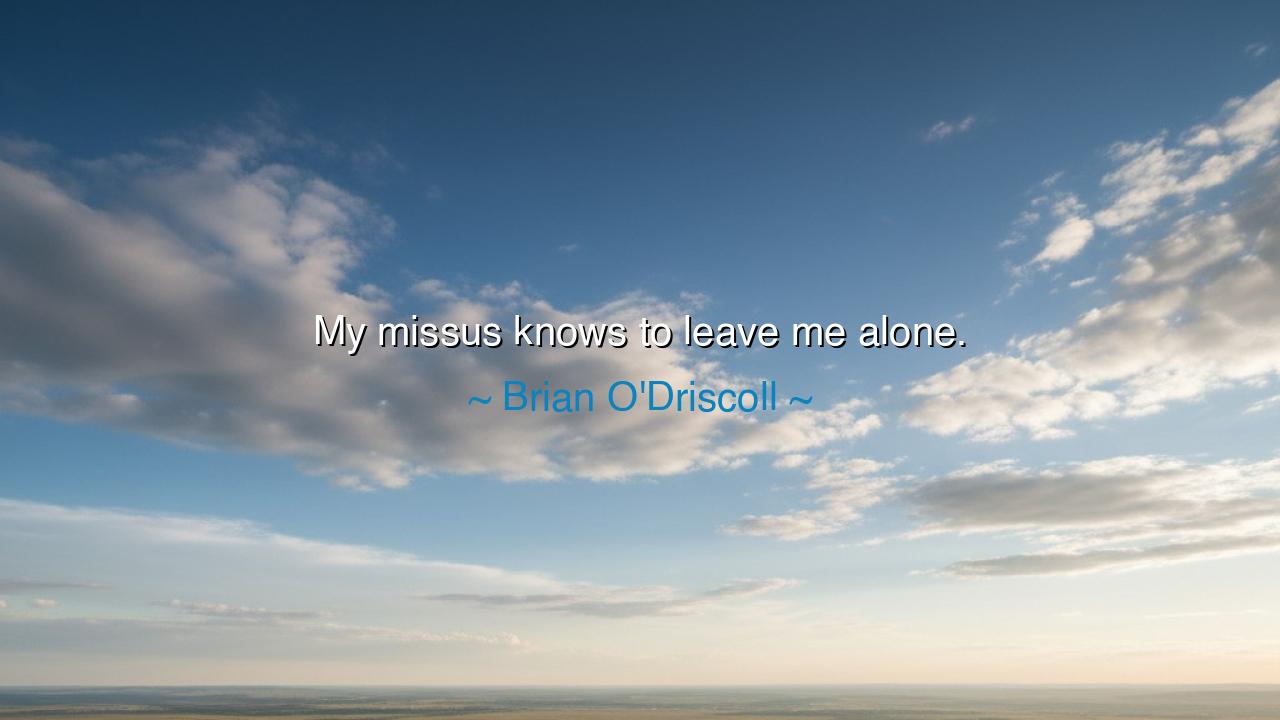
My missus knows to leave me alone.






“My missus knows to leave me alone.” — thus spoke Brian O’Driscoll, the Irish rugby legend whose words, though wrapped in simplicity, conceal a deep truth about respect, balance, and solitude within love. At first glance, his statement may seem like an offhand comment from a man of few words, spoken in jest or in the rhythm of ordinary life. Yet to the attentive ear, there is ancient wisdom in it — the wisdom of boundaries, of space, and of understanding between souls who share their lives. For even in love, the greatest of bonds, there must be moments of aloneness — moments where one withdraws not in anger, but in reflection, not in rejection, but in renewal.
Brian O’Driscoll, a warrior on the field and a leader among men, knew well the weight of pressure — the roar of the crowd, the clash of bodies, the burden of expectation. In such a life, even heroes require silence. His missus, his beloved, understood this truth and honored it: that a man must sometimes be left alone to meet himself again, to release his thoughts, to breathe. Her wisdom was not in presence but in patience, not in closeness but in trust. For love that is too demanding suffocates, while love that gives space strengthens both hearts. Thus, O’Driscoll’s simple statement becomes a testament to a deeper harmony between man and woman, between companionship and individuality.
To “leave one alone” is not to abandon — it is to respect the sacred solitude that every soul requires. Even the closest of companions must recognize that love thrives not only in togetherness, but also in distance. The strongest relationships are those in which both partners understand that there are battles one must fight alone — inner storms that cannot be shared, doubts that must be faced in silence. The missus who “knows to leave him alone” is not indifferent; she is wise. She trusts that solitude will not estrange them, but renew him — that from his quiet, he will return not diminished, but restored.
The ancients, too, spoke of this mystery of solitude. In the tales of Odysseus and Penelope, though separated by years and oceans, their bond endured because it was built upon mutual faith. Penelope did not chase the absent hero nor despair in his silence. She trusted in the constancy of love and in the necessity of his journey. In the same way, every relationship must endure such seasons of distance — not measured by miles, but by the quiet spaces where each person must tend their own inner fire. The one who understands this — who gives silence instead of suffocation — keeps the flame of love pure and steady.
There is also in O’Driscoll’s words a reminder for all who bear heavy burdens. Whether athlete, worker, parent, or artist, each person needs time to be alone — to shed the masks required by the world and to sit, if only for a moment, in the company of one’s own soul. In such solitude, one hears again the voice of reason, the whisper of conscience, the memory of purpose. The missus, the friend, the family who understands this — who gives that space freely — becomes not a distant presence but a pillar of strength, invisible yet unshakable.
But this truth cuts both ways. The one who is “left alone” must not mistake solitude for selfishness. It is a time to reflect, not to withdraw into coldness; a time to recharge, not to forget those who wait. Solitude and companionship are two wings of the same bird — one gives the strength to fly, the other gives the direction. The wise man, when left alone, uses that time not to escape love, but to deepen it through reflection and gratitude. And when he returns, his heart is steadier, his affection more sincere, his spirit more whole.
Lesson: In love, learn the art of giving space. If you are the one who loves, do not fear your partner’s silence; trust that their solitude is not a sign of distance, but of growth. And if you are the one who needs space, take it not with bitterness but with purpose — to find your calm, your strength, your clarity. Speak honestly, and love deeply, but do not cling. For true love is not possession, but freedom; not constant nearness, but constant understanding.
Thus, Brian O’Driscoll’s simple, almost humorous remark becomes a saying of quiet power. “My missus knows to leave me alone.” In it lies the balance of modern love and ancient wisdom — that affection must breathe to live, and that solitude, rightly understood, is not the enemy of love but its guardian. The greatest bonds are those where two souls, though separate, move in harmony — together in purpose, free in spirit, bound not by fear, but by trust.






AAdministratorAdministrator
Welcome, honored guests. Please leave a comment, we will respond soon